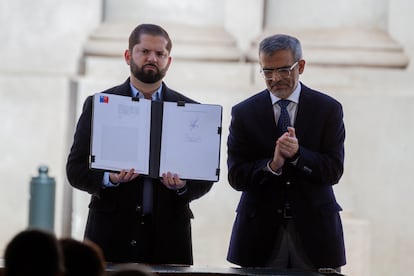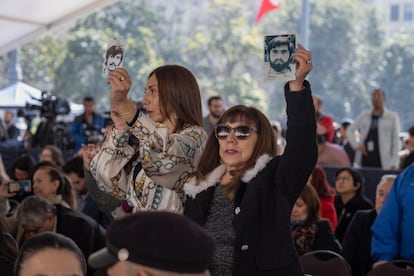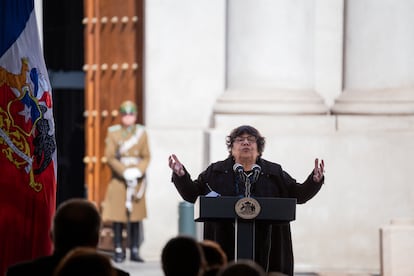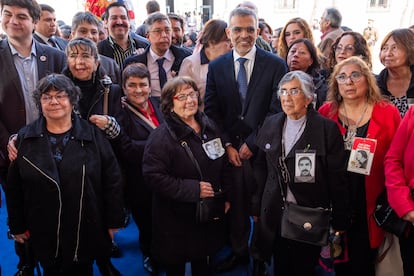Fifty years after Pinochet coup, Chile to search for over 1,000 victims of enforced disappearance
The commemoration has triggered clashes between left-wing and opposition politicians, who accuse President Gabriel Boric of having a biased vision


On the eve of the commemoration of the 50th anniversary of the coup of September 11, 1973, Chile’s left-wing president, Gabriel Boric, presented the Truth and Justice Search Plan in Constitution Square, in the nation’s capital Santiago, before some 500 attendees. Many of them were relatives of political detainees who disappeared and were executed during the dictatorship of Augusto Pinochet (1973-1990). It was an emotional ceremony during which Boric signed a decree, together with Justice Minister Luis Cordero, to make the program a permanent and systematic state policy with the goal of finding and identifying 1,092 missing persons.
The Search Plan is the most important project of the Boric Administration in connection with the 50th anniversary of the military coup, and it has been prepared months in advance. The project hopes to gain new insight into the circumstances in which people were detained, made to disappear and executed by the Pinochet dictatorship, and crosscheck this information against the hundreds of judicial investigations that remain open in the courts. The Search Plan was presented on August 30, the International Day of Victims of Enforced Disappearances.

During the dictatorship, which lasted 17 years, at least 3,200 people were murdered or made to disappear. According to the information collected by the Ministry of Justice, 1,469 people were victims of enforced disappearance and of these, 1,092 were under arrest at the time of their disappearance.
There are still 377 executed people whose bodies have not been returned to their families, and only 307 victims of enforced disappearance have been identified. “That figure should hurt us, it should make our blood boil because it shows the magnitude of the debt we have as a state and as a society,” said Boric. “With this public policy, which is permanent, we are taking charge as a state, not just as a government, of doing everything within our reach and pushing the barriers of what we have been told is possible, in order to clarify the circumstances of the disappearance, and/or death, and the final fate of fellow Chileans who were the victims of enforced disappearances, in keeping with the obligations of the State of Chile and international standards.”
That figure should hurt us, it should make our blood boil because it shows the magnitude of the debt we have as a state and as a societyChilean President Gabriel Boric
Boric recalled the recent sentences handed down by the Supreme Court, including one that convicted seven former soldiers for the kidnapping and murder of the Chilean singer-songwriter Víctor Jara. One of the seven later took his own life.
“What we are doing today is a gesture of democracy because it is an act of state that assumes memory in a way that is not fueled by resentment, but by the conviction that the only possibility of building a future that is freer and more respectful of life and human dignity is to know the whole truth,” added Boric, noting that the initiatives are backed by funding to ensure they can be implemented.

During the ceremony, Boric was preceded by the president of the Group of Disappeared Detainees, Gaby Rivera, and the Group of Relatives of Politically Executed Persons, Alicia Lira. Rivera recalled that, following the coup and the crimes committed by agents of the dictatorship, the Chilean state never provided an explanation or showed the slightest deference to the surviving families. “The state made the family members disappear and the state has to take charge. And if we have to be there 50 more years, that’s how it will be,” said Rivera.
A divided country
The commemoration of the 50th anniversary of the coup has triggered clashes between left-wing and opposition politicians in Chile. Last August 22, inside the Chamber of Deputies, there was an incident involving screams and insults.
Lawmakers for the conservative Independent Democratic Union (UDI), together with the Chile Vamos bloc and the far-right Republican Party, promoted the reading of an old declaration from August 22, 1973, made 20 days before the coup, which denounced the “serious breach of the constitutional and legal order of the Republic” perpetrated by the Salvador Allende Administration and asked the ministers who were part of the Armed Forces “to immediately put an end to all situations that violate the Constitution and the laws.”
On July 15, during his first tour of Europe, Boric announced in an interview with Spanish broadcaster Cadena SER that he would call on Chilean political parties to sign a joint declaration to commemorate the 50th anniversary of the coup. He said he wanted all political forces “to agree, regardless of our current positions, that the problems of democracy must be resolved with more democracy and not with less. Therefore, a coup is unacceptable. And, in second place, that not even the most acute differences justify the violation of the human rights of those who think differently.”

However, his approach was not accepted by the opposition, which feels that the president has a one-sided view of the coup. “We are not available to sign any agreement that is written with the left hand, with a biased vision co-opted by the Communist Party, with a vision of the past,” said Frank Sauerbaum of the liberal conservative National Renewal.
On Wednesday, as he ended his speech during the presentation of the Search Plan, the president returned to this point. He regretted “the absences at this ceremony because the leaders of all political parties were invited here and not all of them came.” And then he insisted: “I think it is time for us to agree on something that is very basic, that does not require context, that does not require further explanations, which is that we will never again interrupt democracy through violence and never again violate the human rights of another person for thinking differently, nothing more. And for those who like to interpret things, we are not talking about the past, we are talking about what lies ahead, about the society we are building.”
Sign up for our weekly newsletter to get more English-language news coverage from EL PAÍS USA Edition
Tu suscripción se está usando en otro dispositivo
¿Quieres añadir otro usuario a tu suscripción?
Si continúas leyendo en este dispositivo, no se podrá leer en el otro.
FlechaTu suscripción se está usando en otro dispositivo y solo puedes acceder a EL PAÍS desde un dispositivo a la vez.
Si quieres compartir tu cuenta, cambia tu suscripción a la modalidad Premium, así podrás añadir otro usuario. Cada uno accederá con su propia cuenta de email, lo que os permitirá personalizar vuestra experiencia en EL PAÍS.
¿Tienes una suscripción de empresa? Accede aquí para contratar más cuentas.
En el caso de no saber quién está usando tu cuenta, te recomendamos cambiar tu contraseña aquí.
Si decides continuar compartiendo tu cuenta, este mensaje se mostrará en tu dispositivo y en el de la otra persona que está usando tu cuenta de forma indefinida, afectando a tu experiencia de lectura. Puedes consultar aquí los términos y condiciones de la suscripción digital.








































